unit3
- 格式:docx
- 大小:306.69 KB
- 文档页数:26
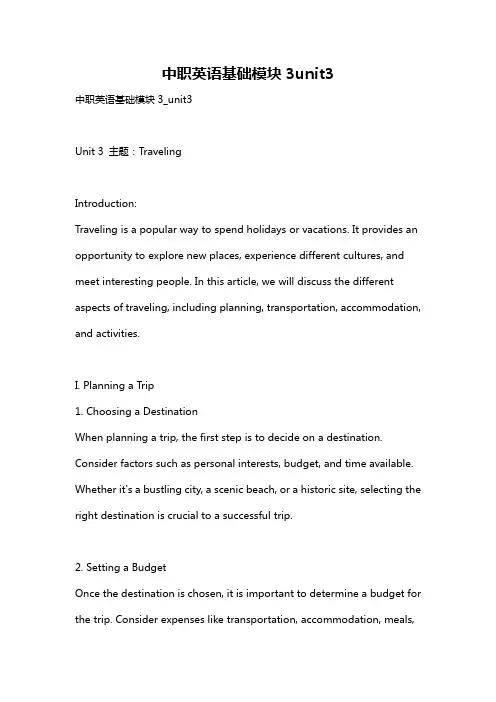
中职英语基础模块3unit3中职英语基础模块3_unit3Unit 3 主题:TravelingIntroduction:Traveling is a popular way to spend holidays or vacations. It provides an opportunity to explore new places, experience different cultures, and meet interesting people. In this article, we will discuss the different aspects of traveling, including planning, transportation, accommodation, and activities.I. Planning a Trip1. Choosing a DestinationWhen planning a trip, the first step is to decide on a destination. Consider factors such as personal interests, budget, and time available. Whether it's a bustling city, a scenic beach, or a historic site, selecting the right destination is crucial to a successful trip.2. Setting a BudgetOnce the destination is chosen, it is important to determine a budget for the trip. Consider expenses like transportation, accommodation, meals,activities, and souvenirs. Research the cost of living in the destination to ensure the budget is realistic.3. Researching the DestinationTo make the most of a trip, research the destination beforehand. Learn about local customs, traditions, and attractions. Find out about any necessary travel documents, vaccinations, or safety precautions. Knowing these details will enhance the overall travel experience.II. Transportation Options1. Choosing a Mode of TransportationAfter determining the destination, one must decide on the best mode of transportation. Consider factors such as distance, budget, speed, and convenience. Options may include traveling by plane, train, bus, or car.2. Booking TicketsOnce the mode of transportation is selected, it is important to book tickets in advance to secure the best deals. Various online platforms and travel agencies offer discounted fares, so comparing prices and booking early can save money.III. Accommodation Choices1. Selecting the Right AccommodationWhen it comes to choosing accommodation, there are several options available. Hotels, hostels, guesthouses, and vacation rentals are some common choices. Consider factors such as location, price, amenities, and reviews when making a decision.2. Making ReservationsAfter deciding on the type of accommodation, it is advisable to make reservations in advance, especially during peak travel seasons. This ensures availability and prevents last-minute stress or disappointment.IV. Activities and Sightseeing1. Planning ActivitiesBefore embarking on a trip, plan a list of activities and sights to see. Research popular attractions, museums, parks, and landmarks in the destination. Include both must-visit sites and off-the-beaten-path experiences to get a well-rounded travel experience.2. Exploring the DestinationOnce at the destination, explore the surroundings and immerse in the local culture. Take guided tours, try local cuisines, participate in traditional activities, and interact with the locals. This will createunforgettable memories and enrich the travel experience.Conclusion:Traveling is an exciting way to escape from daily routines and explore the world. By carefully planning the trip, choosing suitable transportation and accommodation, and engaging in various activities, one can make the most of their travel experience. Whether it's a short weekend getaway or a long international adventure, travel offers an opportunity for personal growth, cultural understanding, and unforgettable memories. So, start planning your next trip and embark on a new adventure!。
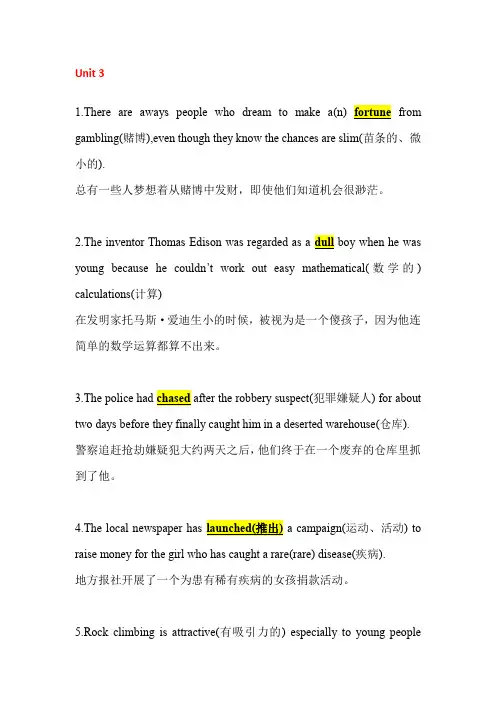
Unit 31.There are aways people who dream to make a(n) from gambling(赌博),even though they know the chances are slim(苗条的、微小的).总有一些人梦想着从赌博中发财,即使他们知道机会很渺茫。
young because he couldn’t work out easy mathematical(数学的) calculations(计算)在发明家托马斯·爱迪生小的时候,被视为是一个傻孩子,因为他连简单的数学运算都算不出来。
犯罪嫌疑人) for about two days before they finally caught him in a deserted warehouse(仓库).警察追赶抢劫嫌疑犯大约两天之后,他们终于在一个废弃的仓库里抓到了他。
运动、活动) to raise money for the girl who has caught a rare(rare) disease(疾病).地方报社开展了一个为患有稀有疾病的女孩捐款活动。
5.Rock climbing is attractive(有吸引力的) especially to young peoplebecause it is always with hardship(困难) and adventure.攀岩是具有吸引力的,尤其是对年轻人来说,因为它总是伴随着困难和冒险。
6.The face value(面值) of the bill(账单、钞票(内在的) value is nothing but that of a piece of paper.该票据面值为一美元,但其内在价值只是一张纸。
7.Having won several championships in international matches recently,hecurrently(目前among the world’s professional tennis players.在最近的国际比赛中赢得了几次冠军,他目前在世界上职业网球选手中排名第二。
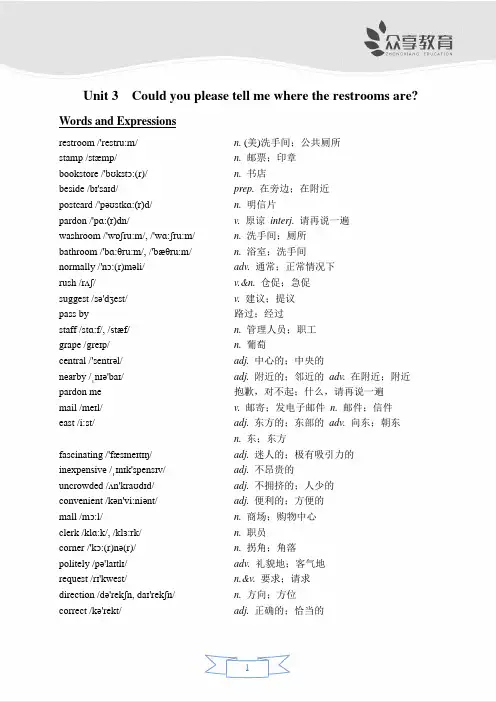
Unit 3 Could you please tell me where the restrooms are? Words and Expressionsrestroom /'restru:m/ n. (美)洗手间;公共厕所stamp /stæmp/ n.邮票;印章bookstore /'bʊkstɔ:(r)/ n.书店beside /bɪ'saɪd/ prep.在旁边;在附近postcard /'pəʊstkɑ:(r)d/ n.明信片pardon /'pɑ:(r)dn/ v.原谅interj.请再说一遍washroom /'wɒʃru:m/, /'wɑ:ʃru:m/ n.洗手间;厕所bathroom /'bɑ:θru:m/, /'bæθru:m/ n.浴室;洗手间normally /'nɔ:(r)məli/ adv.通常;正常情况下rush /rʌʃ/ v.&n.仓促;急促suggest /sə'dʒest/ v.建议;提议pass by 路过;经过staff /stɑ:f/, /stæf/ n.管理人员;职工grape /greɪp/ n.葡萄central /'sentrəl/ adj.中心的;中央的nearby /ˌnɪə'baɪ/ adj.附近的;邻近的adv.在附近;附近pardon me 抱歉,对不起;什么,请再说一遍mail /meɪl/ v.邮寄;发电子邮件n.邮件;信件east /i:st/ adj.东方的;东部的adv.向东;朝东n.东;东方fascinating /'fæsɪneɪtɪŋ/ adj.迷人的;极有吸引力的inexpensive /ˌɪnɪk'spensɪv/ adj.不昂贵的uncrowded /ʌn'kraʊdɪd/ adj.不拥挤的;人少的convenient /kən'vi:niənt/ adj.便利的;方便的mall /mɔ:l/ n. 商场;购物中心clerk /klɑ:k/, /klɜ:rk/ n. 职员corner /'kɔ:(r)nə(r)/ n. 拐角;角落politely /pə'laɪtlɪ/ adv. 礼貌地;客气地request /rɪ'kwest/ n.&v. 要求;请求direction /də'rekʃn, daɪ'rekʃn/ n. 方向;方位correct /kə'rekt/ adj. 正确的;恰当的polite /pə'laɪt/ adj. 有礼貌的;客气的direct /də'rek, daɪ'rek / adj.直接的;直率的speaker /'spi:kə(r)/ n. 讲(某种语言)的人;发言者whom /hu:m/ pron. 谁;什么人impolite /'ɪmpə'laɪt/ adj. 不礼貌的;粗鲁的address /ə'dre/, /'ædres/ n.住址;地址;通讯处underground /'ʌndə(r)graʊnd/ adj.地下的n.地铁parking lot 停车场;停车区course /kɔ:(r)s/ n.课程;学科Italian /ɪ'tælɪən/ adj.意大利(人)的n. 意大利人;意大利语Tim /tɪm/ 蒂姆(男名)Role-play the conversation.He Wei: This is Fun Times Park, the biggest amusementpark in our city!Alice: I’m excited to try the rides!He Wei: Where should we start with? There’s SpaceWorld, Water World, Animal World...Alice: Before we decide, could you first tell me wherethe restrooms are?He Wei: Pardon? Restroom? You want to rest? But we haven’t even started yet!Alice: Oh no, I don’t mean that. I mean ... you know, a washroom or bathroom.He Wei: Hmm ... so you mean ... the toilet?Alice: Yes! Sorry, maybe people in China don’t often use th e word “restroom”when they speak English.He Wei: That’s right. In China, we normally say “toilet”or “washroom” in English. Anyway, t hey’re over there.Alice: OK. I’ll be quick!He Wei: No problem. Y ou don’t need to rush!Reading 1Read the conversation and answer the questions below.1. Why did Alice not want to go on the new ride? How did she feel after the ride?2. What is special about Uncle Bob’s restaurant? Should Alice and He Wei get there early for dinner? Why?Fun Times Park — Always a Fun Time![Alice and He Wei are in Space World.]Alice: I wonder where we should go next.He Wei: How about that new ride over there?Alice: Well ... it looks scary.He Wei: Come on! I promise it’ll be exciting! If you’re scared, just shout or hold my hand. [After the ride…]Alice: You were right! That was fun! I was scared at first, but shouting did help.He Wei: See, that wasn’t so bad, right? You never know until you try something.Alice: Yes, I’m so glad I tried it!He Wei: Do you want to go to Water World now?Alice: Sure, but I’m getting hungry. Do you know where we can get some good food quickly?He Wei: Of course! I suggest Water City Restaurant in Water World. It serves delicious food. Alice: Great! Let’s go![On their way to Water City Restaurant, Alice and He Wei pass by Uncle Bob’s.]Alice: Look! This restaurant looks interesting. The sign says a rock band plays here every evening.He Wei: Why don’t we come back here for dinner later? Let’s ask what time t he band starts playing.[Alice and He Wei walk up to a staff person at the door.]He Wei: Excuse me, could you tell us when the band starts playing this evening?Staff: Eight o’clock. The restaurant is always busy at that time, so come a little earlier to geta table.He Wei: OK, thank you!Grammar FocusExcuse me, do you know where I can buy some medicine? Sure. There’s a supermarket down the street.Could you please tell me how to get to the post office? Sorry, I’m not sure how to getthere.Can you tell us when the band starts playing thisevening?It starts at 8:00 p.m.I wonder where we should go next. You should try that new ride overthere.语法小结:一、礼貌用语Excuse me, do you know…Could you please tell me…I wonder…Please tell me…Pardon me,…I’d like to know…Have you any idea…Would you mind telling me…二、wh-引导的宾语从句I wonder when the park closes today.我想知道这个公园今天什么时候关门。
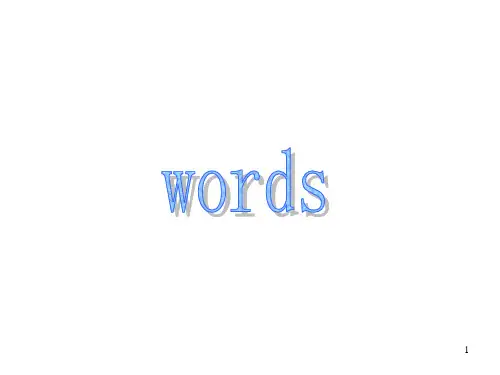
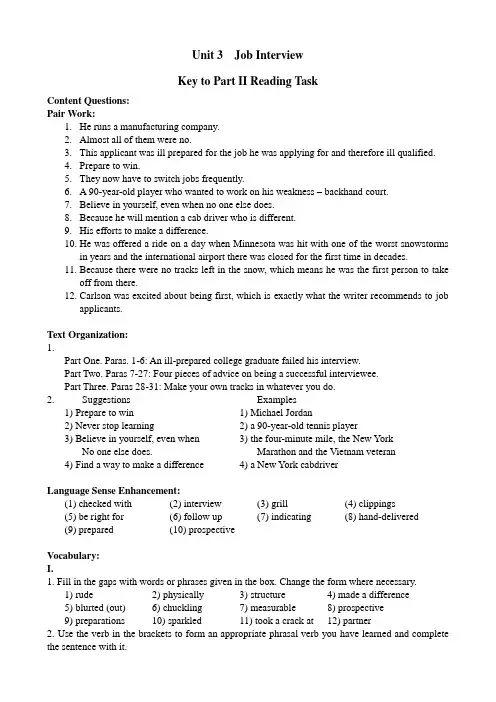
Unit 3 Job InterviewKey to Part II Reading TaskContent Questions:Pair Work:1.He runs a manufacturing company.2.Almost all of them were no.3.This applicant was ill prepared for the job he was applying for and therefore ill qualified.4.Prepare to win.5.They now have to switch jobs frequently.6. A 90-year-old player who wanted to work on his weakness – backhand court.7.Believe in yourself, even when no one else does.8.Because he will mention a cab driver who is different.9.His efforts to make a difference.10.He was offered a ride on a day when Minnesota was hit with one of the worst snowstormsin years and the international airport there was closed for the first time in decades.11.Because there were no tracks left in the snow, which means he was the first person to takeoff from there.12.Carlson was excited about being first, which is exactly what the writer recommends to jobapplicants.Text Organization:1.Part One. Paras. 1-6: An ill-prepared college graduate failed his interview.Part Two. Paras 7-27: Four pieces of advice on being a successful interviewee.Part Three. Paras 28-31: Make your own tracks in whatever you do.2. Suggestions Examples1) Prepare to win 1) Michael Jordan2) Never stop learning 2) a 90-year-old tennis player3) Believe in yourself, even when 3) the four-minute mile, the New YorkNo one else does. Marathon and the Vietnam veteran4) Find a way to make a difference 4) a New York cabdriverLanguage Sense Enhancement:(1) checked with (2) interview (3) grill (4) clippings(5) be right for (6) follow up (7) indicating (8) hand-delivered(9) prepared (10) prospectiveVocabulary:I.1. Fill in the gaps with words or phrases given in the box. Change the form where necessary.1) rude 2) physically 3) structure 4) made a difference5) blurted (out) 6) chuckling 7) measurable 8) prospective9) preparations 10) sparkled 11) took a crack at 12) partner2. Use the verb in the brackets to form an appropriate phrasal verb you have learned and complete the sentence with it.1) go after 2) look back on/at 3) be put up 4) stood for5) build in 6) follow up 7) be hooked up to 8) closed up3. Rewrite each sentence with the word or phrase in the brackets, keeping the same meaning.1) grilled her about where she had been all night.2) beyond Cinderella’s wildest dreams that she could one day dance in the King’s palace.3) will be in readers’ hands soon4) do your homework before going on an interview5) was in the neighborhood of 150 dollars4. Complete the sentences, using the words or phrases in brackets.1) applicants; veteran; the prospective2) From his standpoint; has made every endeavor to go after3) as the saying goes; to have a crack at; barelyII. Words with Multiple Meanings1.behave2.keep (used to avoid repetition)3.clean4.get along5.perform/complete6.perform/complete7.study8.be enough9.be acceptableIII. Usage:1.There is so much to say and it is hard to know where to begin. OK,I’ll talk about myself first.2.Thank you very much, John, for your beautiful Christmas card. By the way, I have somethinghere for you.3.The new computer language can be quite easily understood by anyone who can read the dailynewspaper. Now, why is this an advantage?4.I’m going to work out the outline and will let you know how it goes. By the way, I will see youin February, as I plan to attend your seminar in Shanghai.5.OK, you got the job. Now, how to maximize your profits with as little effort as possible?6.Chris is back from Australia. Incidentally, those pictures you sent me are wonderful. Comprehensive Exercises:I. Cloze.1. Text-related:(1) prospective (2) As I see it (3) done your homework (4) beforehand(5) endeavor (6) structure (7) partners (8) Respond(9) take a crack (10) from the standpoint (11) make a difference(12) follow up1. Theme-related:(1) encouraging (2) inquiry (3) relevant (4) samples (5) references(6) advice (7) preparing (8) seriously (9) probably (10) exhibitII. Translation:1. Translate the sentences into English.1) Despite the inadequate length of the airstrip in this emergency landing, the veteran pilot managed to stop the plane after taxiing for only a short while.2) Grilled by the reporters, the movie star eventually blurted (out) that she had undergone two plastic surgeries.3) We have the technology and our partner has the capital. Working together, we’ll have the future in our hands.4) If I had know beforehand that you would bring some many friends home, I would have made better preparations. You see, I have barely enough food and drinks for a snack.5) People gave generously upon learning that new school rooms with stronger structures were to be built in the earthquake-stricken area.2. Translate the passage into English.Well begun, half done, as the saying goes. It is extremely important for a job applicant to do his homework while seeking employment. From my standpoint, whether or not one has done his homework clearly makes a difference in his chance of success.I have a friend who is earning somewhere in the neighborhood of 100,000 dollars a year in a large computer software company. He told me that from his own experience the decision makers who interview prospective employees like people who are well prepared. Those who make no endeavor to learn as much about his prospective employer as possible don’t have much of a chance of success.。
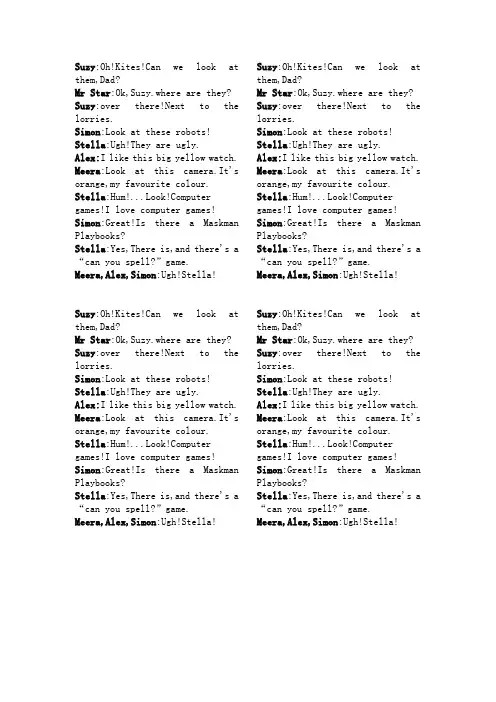
them,Dad?Mr Star:Ok,Suzy.where are they? Suzy:over there!Next to the lorries.Simon:Look at these robots! Stella:Ugh!They are ugly.Alex:I like this big yellow watch. Meera:Look at this camera.It's orange,my favourite colour. Stella:Hum!...Look!Computer games!I love computer games! Simon:Great!Is there a Maskman Playbooks?Stella:Yes,There is,and there's a “can you spell?”game.Meera,Alex,Simon:Ugh!Stella!Suzy:Oh!Kites!Can we look at them,Dad?Mr Star:Ok,Suzy.where are they? Suzy:over there!Next to the lorries.Simon:Look at these robots! Stella:Ugh!They are ugly.Alex:I like this big yellow watch. Meera:Look at this camera.It's orange,my favourite colour. Stella:Hum!...Look!Computer games!I love computer games! Simon:Great!Is there a Maskman Playbooks?Stella:Yes,There is,and there's a “can you spell?”game.Meera,Alex,Simon:Ugh!Stella! them,Dad?Mr Star:Ok,Suzy.where are they? Suzy:over there!Next to the lorries.Simon:Look at these robots! Stella:Ugh!They are ugly.Alex:I like this big yellow watch. Meera:Look at this camera.It's orange,my favourite colour. Stella:Hum!...Look!Computer games!I love computer games! Simon:Great!Is there a Maskman Playbooks?Stella:Yes,There is,and there's a “can you spell?”game.Meera,Alex,Simon:Ugh!Stella!Suzy:Oh!Kites!Can we look at them,Dad?Mr Star:Ok,Suzy.where are they? Suzy:over there!Next to the lorries.Simon:Look at these robots! Stella:Ugh!They are ugly.Alex:I like this big yellow watch. Meera:Look at this camera.It's orange,my favourite colour. Stella:Hum!...Look!Computer games!I love computer games! Simon:Great!Is there a Maskman Playbooks?Stella:Yes,There is,and there's a “can you spell?”game.Meera,Alex,Simon:Ugh!Stella!them,Dad?Mr Star:Ok,Suzy.where are they? Suzy:over there!Next to the lorries.Simon:Look at these robots! Stella:Ugh!They are ugly.Alex:I like this big yellow watch. Meera:Look at this camera.It's orange,my favourite colour. Stella:Hum!...Look!Computer games!I love computer games! Simon:Great!Is there a Maskman Playbooks?Stella:Yes,There is,and there's a “can you spell?”game.Meera,Alex,Simon:Ugh!Stella!Suzy:Oh!Kites!Can we look at them,Dad?Mr Star:Ok,Suzy.where are they? Suzy:over there!Next to the lorries.Simon:Look at these robots! Stella:Ugh!They are ugly.Alex:I like this big yellow watch. Meera:Look at this camera.It's orange,my favourite colour. Stella:Hum!...Look!Computer games!I love computer games! Simon:Great!Is there a Maskman Playbooks?Stella:Yes,There is,and there's a “can you spell?”game.Meera,Alex,Simon:Ugh!Stella! them,Dad?Mr Star:Ok,Suzy.where are they? Suzy:over there!Next to the lorries.Simon:Look at these robots! Stella:Ugh!They are ugly.Alex:I like this big yellow watch. Meera:Look at this camera.It's orange,my favourite colour. Stella:Hum!...Look!Computer games!I love computer games! Simon:Great!Is there a Maskman Playbooks?Stella:Yes,There is,and there's a “can you spell?”game.Meera,Alex,Simon:Ugh!Stella!Suzy:Oh!Kites!Can we look at them,Dad?Mr Star:Ok,Suzy.where are they? Suzy:over there!Next to the lorries.Simon:Look at these robots! Stella:Ugh!They are ugly.Alex:I like this big yellow watch. Meera:Look at this camera.It's orange,my favourite colour. Stella:Hum!...Look!Computer games!I love computer games! Simon:Great!Is there a Maskman Playbooks?Stella:Yes,There is,and there's a “can you spell?”game.Meera,Alex,Simon:Ugh!Stella!Suzy:Oh!Kites!Can we look at them,Dad?Mr Star:Ok,Suzy.where are they? Suzy:over there!Next to the lorries.Simon:Look at these robots! Stella:Ugh!They are ugly.Alex:I like this big yellow watch. Meera:Look at this camera.It's orange,my favourite colour. Stella:Hum!...Look!Computer games!I love computer games! Simon:Great!Is there a Maskman Playbooks?Stella:Yes,There is,and there's a “can you spell?”game.Meera,Alex,Simon:Ugh!Stella!Suzy:Oh!Kites!Can we look at them,Dad?Mr Star:Ok,Suzy.where are they? Suzy:over there!Next to the lorries.Simon:Look at these robots! Stella:Ugh!They are ugly.Alex:I like this big yellow watch. Meera:Look at this camera.It's orange,my favourite colour. Stella:Hum!...Look!Computer games!I love computer games! Simon:Great!Is there a Maskman Playbooks?Stella:Yes,There is,and there's a “can you spell?”game.Meera,Alex,Simon:Ugh!Stella! Suzy:Oh!Kites!Can we look at them,Dad?Mr Star:Ok,Suzy.where are they? Suzy:over there!Next to the lorries.Simon:Look at these robots! Stella:Ugh!They are ugly.Alex:I like this big yellow watch. Meera:Look at this camera.It's orange,my favourite colour. Stella:Hum!...Look!Computer games!I love computer games! Simon:Great!Is there a Maskman Playbooks?Stella:Yes,There is,and there's a “can you spell?”game.Meera,Alex,Simon:Ugh!Stella!Suzy:Oh!Kites!Can we look at them,Dad?Mr Star:Ok,Suzy.where are they? Suzy:over there!Next to the lorries.Simon:Look at these robots! Stella:Ugh!They are ugly.Alex:I like this big yellow watch. Meera:Look at this camera.It's orange,my favourite colour. Stella:Hum!...Look!Computer games!I love computer games! Simon:Great!Is there a Maskman Playbooks?Stella:Yes,There is,and there's a “can you spell?”game.Meera,Alex,Simon:Ugh!Stella!Suzy:Oh!Kites!Can we look at them,Dad?Mr Star:Ok,Suzy.where are they? Suzy:over there!Next to the lorries.Simon:Look at these robots! Stella:Ugh!They are ugly.Alex:I like this big yellow watch. Meera:Look at this camera.It's orange,my favourite colour. Stella:Hum!...Look!Computer games!I love computer games! Simon:Great!Is there a Maskman Playbooks?Stella:Yes,There is,and there's a “can you spell?”game.Meera,Alex,Simon:Ugh!Stella!Suzy:Oh!Kites!Can we look at them,Dad?Mr Star:Ok,Suzy.where are they? Suzy:over there!Next to the lorries.Simon:Look at these robots! Stella:Ugh!They are ugly.Alex:I like this big yellow watch. Meera:Look at this camera.It's orange,my favourite colour. Stella:Hum!...Look!Computer games!I love computer games! Simon:Great!Is there a Maskman Playbooks?Stella:Yes,There is,and there's a “can you spell?”game.Meera,Alex,Simon:Ugh!Stella! Suzy:Oh!Kites!Can we look at them,Dad?Mr Star:Ok,Suzy.where are they? Suzy:over there!Next to the lorries.Simon:Look at these robots! Stella:Ugh!They are ugly.Alex:I like this big yellow watch. Meera:Look at this camera.It's orange,my favourite colour. Stella:Hum!...Look!Computer games!I love computer games! Simon:Great!Is there a Maskman Playbooks?Stella:Yes,There is,and there's a “can you spell?”game.Meera,Alex,Simon:Ugh!Stella!Suzy:Oh!Kites!Can we look at them,Dad?Mr Star:Ok,Suzy.where are they? Suzy:over there!Next to the lorries.Simon:Look at these robots! Stella:Ugh!They are ugly.Alex:I like this big yellow watch. Meera:Look at this camera.It's orange,my favourite colour. Stella:Hum!...Look!Computer games!I love computer games! Simon:Great!Is there a Maskman Playbooks?Stella:Yes,There is,and there's a “can you spell?”game.Meera,Alex,Simon:Ugh!Stella!。
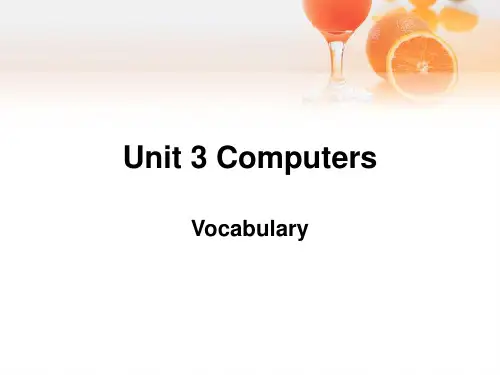
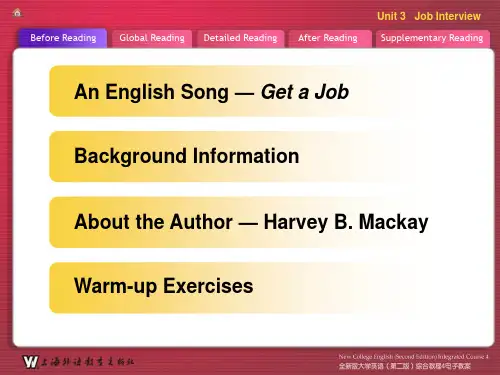
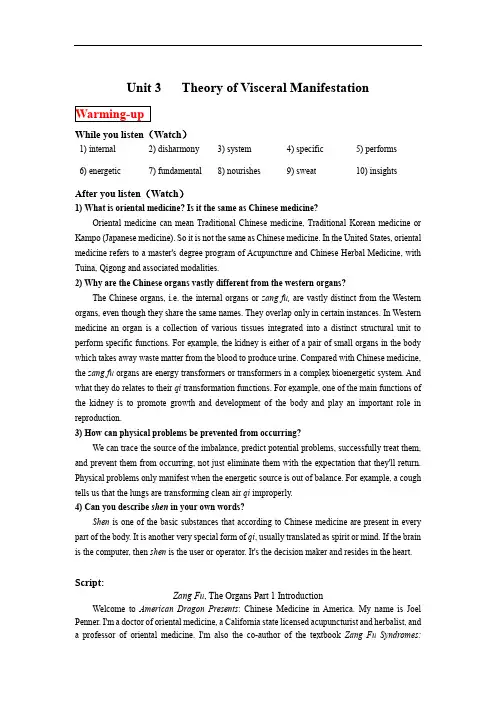
Unit 3 Theory of Visceral ManifestationWhile you listen(Watch)1) internal 2) disharmony3) system 4) specific 5) performs6) energetic7) fundamental8) nourishes9) sweat10) insightsAfter you listen(Watch)1)What is oriental medicine? Is it the same as Chinese medicine?Oriental medicine can mean Traditional Chinese medicine, Traditional Korean medicine or Kampo (Japanese medicine). So it is not the same as Chinese medicine. In the United States, oriental medicine refers to a master's degree program of Acupuncture and Chinese Herbal Medicine, with Tuina, Qigong and associated modalities.2) Why are the Chinese organs vastly different from the western organs?The Chinese organs, i.e. the internal organs or zang fu, are vastly distinct from the Western organs, even though they share the same names. They overlap only in certain instances. In Western medicine an organ is a collection of various tissues integrated into a distinct structural unit to perform specific functions. For example, the kidney is either of a pair of small organs in the body which takes away waste matter from the blood to produce urine. Compared with Chinese medicine, the zang fu organs are energy transformers or transformers in a complex bioenergetic system. And what they do relates to their qi transformation functions. For example, one of the main functions of the kidney is to promote growth and development of the body and play an important role in reproduction.3) How can physical problems be prevented from occurring?We can trace the source of the imbalance, predict potential problems, successfully treat them, and prevent them from occurring, not just eliminate them with the expectation that they'll return. Physical problems only manifest when the energetic source is out of balance. For example, a cough tells us that the lungs are transforming clean air qi improperly.4) Can you describe shen in your own words?Shen is one of the basic substances that according to Chinese medicine are present in every part of the body. It is another very special form of qi, usually translated as spirit or mind. If the brain is the computer, then shen is the user or operator. It's the decision maker and resides in the heart.Script:Zang Fu, The Organs Part 1 IntroductionWelcome to American Dragon Presents: Chinese Medicine in America. My name is Joel Penner. I'm a doctor of oriental medicine, a California state licensed acupuncturist and herbalist, and a professor of oriental medicine. I'm also the co-author of the textbook Zang Fu Syndromes:Differential Diagnosis and Treatment. In this episode, we begin our discussion of the internal organs or zang fu. Z ang fu is the heart and soul of Chinese medicine. Knowing what the organ systems do give us the ability to understand the human body, discover the imbalances that result in disharmony, predict the progression of imbalance, correct the problems, and prevent recurrence. This is called zang fu diagnosis and treatment. It's very important at this point for you to understand that even though they share the same names, the Chinese organs are vastly different from the Western organs. If you try to impose your Western understanding on the Chinese organs, you will get completely confused. Only in certain instances do they overlap. The zang fu are energy transformers or qi transformers in a complex bioenergetic system. And what they do relates to their qi transformation functions.Please look at this chart to my right. This is a schematic drawing of the major qi relationships in the body. As you can see, it's quite complex. We won't go into detail with this chart. However, we will look at parts of it as we discuss the organs.Qi is the fundamental substance of the universe. It is the vital energetic force that gives life to all things. Everything is composed of qi. There are three sources of qi used by the human body. These sources are similar, let's say, to a computer. Electricity is its source of energy. This raw electricity, however, needs to be transformed in order to be usable by the computer. The original stepdown transformation is done by the power supply. It turns the raw electricity into energy that is compatible for use by the computer. In the same way the human body has external sources of energy or qi.Let's look at this chart. It's called the qi axis. The first source of qi is what we call congenital qi. It comes from our parents, from the sperm and the egg. It contains our DNA and is the map of our physical and bioenergetic potentials. This qi is stored in the kidneys. The kidneys then transform this qi so that it can perform specific functions within the body. We'll go into detail about this when we discuss kidney functions. The next source of qi is called clean air qi. It is received by the lungs and transformed into qi that performs different specific functions from kidney qi. And the last source of qi is food and drink, which is received by the stomach, processed and sent to the spleen and pancreas for transformation and the qi that again performs different specific functions from kidney or lung qi.We can relate this to our computers. The sound card in the video card in our computers transforms energy into physical forms like music which can be heard, or videos which can be seen. There is even a printer now that takes electrical impulses and transforms them into a car that can be driven, or a plane that can be flown. The organs also transform energetic or qi patterns into physical manifestations, such as organs for blood or cells. The beauty of the Chinese medical system is that by understanding these two relationships, as I said before, we know what is supposed to happen. We can trace the source of the imbalance, predict potential problems, successfully treat them, and prevent them from occurring, not just eliminate them with the expectation that they'll return. Physical problems only manifest when the energetic source is out of balance, just like static in our computers. The sound system tells us that the sound card isn't transforming the electricity properly. So a cough tells us that the lungs are transforming clean air qi improperly. In the next several videos, we will be discussing how the organs relate to and transform the various different types of qi.I recommend reviewing our video of the five substances. The five substances are also known as the five treasures. These are all types of qi which perform specific functions and include qi,jing, blood, shen and body fluids. A quick review reminds us that qi is the fundamental substance in theuniverse. Everything is a manifestation of qi. Jing is a specialized form of qi that contains the blueprint for our life on earth. It comes from our parents and contains our DNA. Blood is another specialized type of qi that nourishes and moistens the cells. Shen is another very special form of qi which is translated as spirit or mind. If the brain is the computer, then shen is the user or operator. It's the decision maker and resides in the heart.Body Fluids are another specific form of qi which cool, moisten and lubricate the body. Here is a schematic body fluid metabolism. We will be using this chart when we discuss the organs relationships to body fluids. There are thin fluids called jin, such as tears and sweat, which moisten and cool. And there are thick fluids, like spinal or synovial fluid called ye, which lubricate.In our next video, we will be discussing the kidneys and how they transform congenital qi. I'm really excited about this series. My hope is that by understanding this system, you will have new insights about how the human body functions and how you can live a healthy, happy life. See you then.BEFORE CLASS1. Quest for Definition1)visceral manifestation: also called “zang xiang”, first appeared in the Huangdi Neijing. Zang,sharing the same pronunciation with viscera in Chinese, refers to internal organs inside the body;xiang means image or phenomenon. When used together, zang xiang, or visceral manifestations, as analyzed above, simply refers to internal organs and the external manifestations of their physiological and pathological states.2)extraordinary fu-organs: refer to a group of tissues and organs, including the brain, the bonemarrow, the bones, the vessels, the gallbladder and the uterus. Extraordinary fu-organs are characterized by hollowness, and have a similar function to the five zang-organs in storing essence.3)organic holism: TCM believes that the human body is composed of various tissues and organs,including the viscera, the meridians, the five sensory organs, the nine orifices, the four limbs and all the skeletal parts. These different tissues and organs are united into an organic whole because they are closely related to each other in structure, physiology and pathology.4)“The liver opens into the eyes”: The eyes have a close relationship with the liver; becausethey are connected to the liver meridian. The ability to see depends on the nourishment of the eyes from blood stored in the liver, and many liver disorders are reflected in the eyes.5)fullness and solidity (of the zang-fu organs): The five zang-organs only store essence but notexcrete it; that is the reason why they can be full but not solid. The six fu-organs are in charge of transporting and transforming food, so they can be solid but not full.6)“Viscera inside the body must manifest themselves externally”: The internal organs insidethe body are connected to external organs, tissues and corresponding portions. Therefore, the functional condition of the internal organs will inevitably manifest externally. Judging from specific external physiological and pathological signs, doctors can detect the condition of aninternal organ.2. Text-based Activities1) How can the phrase “zang xiang” be interpreted?According to the explanation in some Chinese medical classics, “zang” refers to interior organs which are stored inside the body, and “xiang” refers to exterior manifestations of physiological functions and pathological changes of internal organs. The viscera are stored inside the body and the image is manifested outwardly. For this reason, it is also called “visceral manifestation”.2)What are the physiological functions and functional characteristics of zang-organs and fu-organs respectively?The common physiological function of five zang-organs is to transform and store essence; while that of six fu-organs is to receive, transport and transform water and food. The functional characteristic of zang-organs is to be solid but not full as they only store essence but not excrete it; while that of fu-organs is to be full but not solid as they are in charge of transporting and transforming food.3)What is an extraordinary fu-organ?The extraordinary fu-organs, as a type of fu-organs, differing from the six fu-organs in shape and physiological function, are relatively hermetic organs and do not contact with water and food directly.4)What is the significance to differentiate zang-organs from fu-organs in clinical practice?The differentiation between zang-fu organs helps to identify the type of pattern and establish corresponding therapeutic principles. For instance, the disorders of zang-organs are mostly of deficiency type ; while the disorders of fu-organs are mainly of excess type . The related fu-organ can be purged for the treatment of the excess type of zang-organ disorders, and the related zang-organ can be nourished for the treatment of the deficiency type of fu-organ disorders.5)On what basis has the theory of visceral manifestation been developed?The theory of visceral manifestation has been advanced on the basis of the following development: the knowledge of anatomy accumulated in ancient times, the long-term observation of the human physiological functions and pathological changes, and the repeated medical practice in which certain physiological functions were disproved and analyzed in the light of pathological phenomena and curative effect.FOLLOW-UP ACTIVITIESTask one Comprehension Check1.Questions for Discussion1)How do the zang-fu organs in the theory of visceral manifestation differ from those inWestern medicine? Can you give an example?In the zang-fu theory, the organs are defined not only from their structural level, but much more from their functional level. In another word, the concept of the viscera or organs in TCMweighs much more on the meaning of physiology and pathology instead of anatomy. One organ’s functions in TCM could appear in that of several organs in Western medicine, while one organ’s functions in Western medicine could be distributed into that of several organs in TCM. For instance, the heart in TCM possesses both the functions of controlling blood circulation and mental activities, which are controlled by the heart and brain in Western medicine.2)How do you underst and the “harmony between the heart and kidney”?The harmony between the heart and kidney emphasizes the harmonious coordination between the heart and kidney achieved through the dynamic descending and ascending movement of yin and yang in the heart and kidney. As the heart is located in the upper part of the body, the heart yang qi should descend to strengthen the kidney yang qi’s function of warming the kidney yin fluid, so as to prevent excessive coldness in the kidney. The kidney is situated in the lower part of the body, hence the kidney yin fluid should ascend to help the heart yin fluid to control the heart yang qi, preventing hyperactive heart yang qi from transforming into fire. In summary, the heart-kidney harmonious communication is based on the dynamic balance between the ascending of kidney yin and descending of heart yang.3)Can you explain how the zang-fu organs are involved in the water/fluid transmissionand excretion according to TCM theory?Fluids are received by the stomach, which begins a process of separation, by which the unusable portions of food are sent to the intestines as waste and the pure water is extracted. This process is continued by the spleen, which then sends the pure fluids in a vaporized state upward to the lung. The lung circulates the clear part of the fluids throughout the body, but liquefies whatever has become impure through use and send it downward to the kidney. In the kidney, the impure part is further separated into relatively “clean” and “turbid” parts. The clean part is transformed into mist and sent upward to the lung where it rejoins the cycle. The final impure portion goes into the bladder, where it is stored and subsequently excreted.4)In TCM theory, the spleen could be damaged by emotional factors like over-thinking. Isthere any evidence of the causal relationship between emotional disorder and gastrointestinal diseases in Western medicine?Both the spleen and over-thinking belong to the earth, giving rise to a TCM theory stating that “over-thinking impairs the spleen”. According to TCM theory, over-thinking on one subject will lead to anxiety, with resultant dysfunction in the transport of water and nutrients around the body and the stagnation of qi, indicative of a poorly functioning of the spleen. In Western medicine, recent academic studies support such a correlation between emotional disorder and gastrointestinal diseases. For instance, it was found that Irritable Bowel Syndrome (IBS), which is a collection of patterns of altered bowel movement in the absence of any damage in GI tract, was closely associated with anxiety. This may be explained by the over-stimulation or under-stimulation of the digestive system by the SNS, leading to contradicting IBS symptoms such as constipation and diarrhea. A study also shows that stressors can disrupt the function of GI microbiota by inducing a neural response, which increases the risk of mucosal infection and inflammation. Stress on theGI mucosal immune system can lead to the translocation of pathogenic microbes from the GI tract to the interior of the body, with the resultant infection and the associated inflammatory response. Severe and sustained anxiety can induce peptic ulceration. Symptoms of peptic ulcer, including digestive discomfort and bleeding along the digestive tract, can be related to spleen dysfunction, in which the spleen fails to sustain the function of the digestive system and regulate the circulation of blood.2. Chart Completion1)interior organs;2)exterior manifestations;3)physiology and pathology;4)clinical practice;5)the heart, liver, spleen, lung and kidney;6)the gallbladder, stomach, small intestine, large intestine, bladder and triple energizer;7)the brain, marrow, bone, vessel, gallbladder and uterus;8)transform and store;9)receive, transport and transform;10)full but not solid;11)solid but not full;12)shape and physiological function;13)deficiency;14)nourishing;15)excess;16)purging;17)knowledge of anatomy;18)physiological functions and pathological changes;19)pathological phenomena and curative effect;20)organic holism;21)the interconnection between meridians;22)mental and emotional activities;23)generalizesTask Two Vocabulary1. Directions: Complete the following phrases respectively according to its corresponding meaning or equivalent in Chinese within the brackets.1) exterior2) dissect3) physiological4) holistic5) excess6) mental7) clinical8) emotional9) organic10)consciousness 11) visceral12) anatomical13)deficiency14)morphological 15) anatomy16) purge17) therapeutic18) nourish19) internal20) maintenance 21)interconnection 22)differentiate23)foundation24) texture25) disprove 26) artery27) curative28)transforming29) essence30) deduce2. Match the following words with their proper meanings.1) e2) h 3) m4) b5) i6) o7) d8) g9) f10) l11) a12) j 13) n 14) k15) c3.Fill in the blanks with the words from the box and change the form when necessary.1) holism 2) capacity3) maintenance4)physiological5) mental6) nourishing7)pathological8) manifestation 9) expounded10)generalized 11) disproved12) hermetic13) therapeutics14) collective15)correspondingTask Three Translation1 Translate the following medical expressions into English.1)theory of visceral manifestation2)five zang-organs and six fu-organs3)extraordinary fu-organs4)stuffy nose and running nose5)transport and transform water and food6)store essence7)internal and external relations8)curative effect9)clinical practice10)only store essence but not excrete it11)receive food but not to store essence12)be full but not solid13)be solid but not full14)mental and emotional activities15)physiological function16)pathological change17)The five zang-organs pertain to yin.18)The six fu-organs pertain to yang.19)anatomical concept20)holism/ concept of holism2 Translate the following sentences into Chinese or English.1)藏象学说是研究人体各个脏腑的生理功能、病理变化及其相互关系的学说。
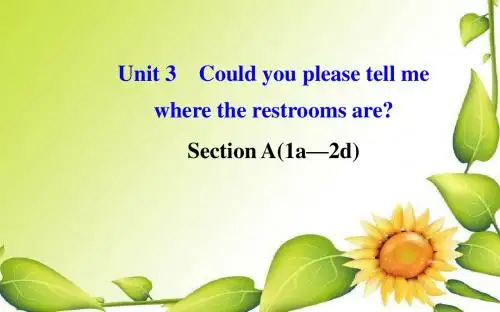
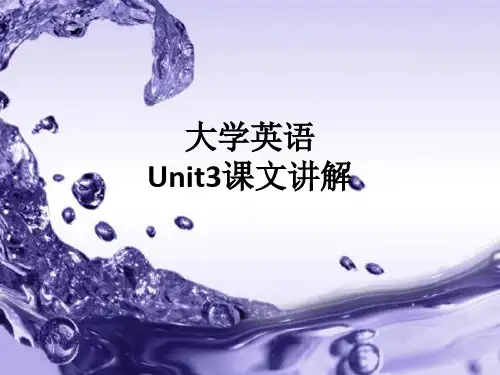
新标准大学英语综合教程3 unit3 课文翻译Unit3Active reading 1我们是怎样听音乐的我们都按照各自不同的能力来听音乐。
但为了便于分析,如果把听的整个过程分成几个组成部分,那么这个过程会更清晰一些。
从某种意义上来说,我们听音乐有三个不同的层次。
由于缺乏更好的术语,我们姑且把它们命名为:(1)感官层次;(2)表现层次;(3)纯音乐层次。
把听的过程机械地分割为以上三个假想的层次,唯一的好处是让我们更清楚地了解自己是怎样听音乐的。
听音乐最简单的方式是为了去获取乐声带来的纯粹的愉悦感,这是音乐的感官层次。
在这个层次上,我们只是听音乐,不做任何思考。
我们打开收音机,一边做着其他的事情,一边心不在焉地沉浸在音乐中。
乐声本身的魅力带我们进入一种无需思考的美妙心境。
令人意外的是,许多自认为是合格的音乐爱好者在听音乐时过多地使用了这一层次。
他们去听音乐会是为了忘却自我。
他们把音乐当成一种慰藉,一种逃避,由此他们进入了一个可以忘却日常生活的理想世界。
当然,他们也没有在思考音乐。
音乐允许他们离开现实,到另一个地方去做梦,因为音乐而做梦,做有关音乐的梦,却从没有真正欣赏过音乐。
的确,乐声的魅力是一种强大而原始的力量,但是你不该让它占据你过多的兴趣空间。
感官层次是音乐的一个重要层次,非常重要,但并不是音乐的全部。
音乐存在的第二个层次就是我所说的表现层次。
一提到这个问题,我们马上就进入到一个颇具争议的领域。
作曲家总是设法避开有关音乐表现方面的讨论。
斯特拉温斯基不是曾经声称他的音乐是一个“物体”,是一件有自我生命的“东西”,除了纯音乐性的存在之外没有任何别的含意吗?斯特拉温斯基这种不妥协的态度可能源于这样的一个事实:有那么多的人尝试着从众多的音乐作品中读出完全不同的含意。
确实,要准确地说出一部音乐作品的含意已经很难了,要肯定并确定地说出来,还要使每个人对你的解释都感到满意,是难上加难。
但我们不该因此走到另一个极端,不能去剥夺音乐“表现”的权利。
My Stroke of LuckShe keeps saving my life. Better still, she keeps giving me reasons to live.Kirk Douglas1It happened on the way home from a meeting in Fillmore, 40 miles north of Los Angeles.My friend Noel Blanc, a helicopter pilot, offered to give me a ride back to the city. We were50 feet in the air when we collided with a small plane flown by a flight instructor and hisyoung student. Noel and I survived, but the men in the plane died instantly.2I don’t remember being pulled from the wreckage or the ambulance trip to a nearby hospital. But I do remember my wife, Anne, staring down at me on my gurney. After hearing of the accident, Anne took a helicopter to reach me. She insisted on moving me to our neighborhood hospital in L.A., Cedars-Sinai Medical Center. Another helicopter ride. Just what I needed!3But Anne was right. In L.A. I could get the best care for my spinal injury and start seeing psychiatrists for my very real “survivor’s guilt”1. Anne has such good judgment and intuition, she rarely makes a wrong decision. After all, she first saved my life in 1958, when she refused to let me join film producer Mike Todd on his fatal flight. She saved me again after my stroke in 1995, when I became depressed and suicidal.24Anne’s secret is that she learns from life, then moves on. Born in Hanover, Germany, she fled to Belgium to escape fascism as a teenager. She then moved to Paris, surviving the occupation by putting her linguistic ability to work. Fluent in French, English, Italian and her native German, she supported herself by placing German subtitles on French films.5We met in 1953 when I was in Paris to star in Act of Love. I was looking for an assistant, and Anne Buydens showed up at my dressing room for an interview. She wore a blue suit with a white collar, and had very delicate wrists and ankles. Quite striking. I explained the position and she politely said, “I don’t think this job’s right for me.” I was miffed. Here I was, an American movie star. I expected her to be eager for the job.6She did accept the position, but only on a temporary basis. And she eventually agreed to go out with me, which had been my first thought anyhow. But that took some doing on my part too. After our first meeting, I called to invite her to supper at Tour d’Argent, one of Paris’s best restaurants, with fantastic views of the Seine. “No,” she said, “I’m tired. I think I’ll just make myself some eggs and go to bed.” My thought then was, to hell with her.37But it was just that poignant style that made me fall in love. During the following months, while I was filming Ulysses7 in Italy, Anne often met up with me. In 1954, when our next jobs threatened to keep us apart for months at a time, I realized I didn’t want to lose her and asked her to marry me. We slipped away to Las Vegas to tie the knot.48Forty-seven years of marriage is quite a journey. Anne has kept me going through some of the hardest times, which hasn’t always been easy, given that I’m sometimes an actor wrapped up in his ego. After the crash, I couldn’t sit without extreme pain. When we went out, Anne would put me in the rear of the station wagon, where I could stretch out. At dinner with friends, she’d set a place for me as if it were the most natural thing in the world to eat lying on the couch. She consoled me during my survivor’s anguish, but what she wouldn’t tolerate — and here’s the important thing — was me feeling sorry for myself.9Then again, I’ve never seen her feel sorry for herself either. Thirty years ago Anne underwent diagnostic surgery after finding a lump in her breast. Her doctor reported the tumor was malignant, and it was spreading. He encouraged me to authorize him to remove Anne’s breast then and there. I did.10After, I felt guilty having made that choice while she lay unconscious. Anne assured me that I’d done the right thing. She dealt with the cancer, from which she has fully recovered, by helping others —talking to groups about her experiences, and establishing Research for Women’s Cancers with six fellow survivors. Over the years they’ve raised $9 million to help finance a research facility at Cedars-Sinai. Anne recently read an article about the deplorable state of school playgrounds in L.A., and started a program to rebuild and beautify them.11That’s my wife’s method, finding ways her life can help others. I’ve been the beneficiary of that practice many times.5 The afternoon I had my stroke, Anne was playing bridge with Barbara Sonata, and I was home getting a manicure. When my speech started to slur, the manicurist, a former nurse, immediately phoned Anne. My wife was home within ten minutes and had me at the hospital within an hour.12 Although she was my rescuer, Anne, who believes in tough love, wasn’t about to let mejust lie around.6During my recovery, she kicked me out of bed each morning to get me working with my speech therapist. She taught me exercises that helped her when she was learning to speak English, like putting a /d/ before a /j/ to say “just.”My therapist was impressed. One day, feeling proud of my progress, I said, “I think as a treat, tomorrow I’d like to have breakfast in bed.”13 Anne looked at me and said, “You’d like breakfast in bed? I think you’d better sleep in thekitchen!” The most difficult consequence of my stroke was the depression I suffered. While I was going through it, Anne endured my moods but didn’t allow me to complain.14 In the midst of writing my latest book, My Stroke of Luck, I had an epiphany, inspired bymy wife. How to handle a stroke is how to handle life. The world is filled with people who have suffered one misfortune or another. What sets the survivors apart from the others is the willingness to move on, and to help others move on too.7 Anne has been doing that for as long as I’ve known her.Paragraphs 1-2Words and Expressions1. offerv. express willingness (to do sth.)e.g. I don’t need any help, but it was nice of you to offer.The volunteers offered to go where there needed village teachers.n. an expression of readiness to do sth. or to give sth.; an amount of money one is willing topay for sth.e.g. She readily accepted his offer to give her a ride home.Synonym:propose, tenderCollocation:on offer for sale at a reduced price 正出售中under offer having a prospective buyer who has made an offer 已有人出价了2. collide vi. hit each other accidentallye.g. The motorbike and the bus collided at the corner of the street.Synonym:bump into, crash intoCollocation:collide with sb. / sth.e.g. The two ships collided with each other in the heavy storm.Derivation:collision n.3. instantly ad. immediately, at oncee.g. He instantly felt that he was cheated by the girl whom he deeply loved.Seeing the beautiful picture, she bought it instantly.Derivation:instant a.Synonym:directly, instantaneously, promptlyAntonym:graduallyParagraphs 3-4Words and Expressions4. intuition n. the power of knowing sth. without reasoninge.g. Women are apt to believe in their intuition in love.Derivation:intuitive a.intuitively a.Comparison:insight n. ability to see into the true natureperception n. ability to see, hear or understandinstinct n. natural feeling that makes one choose to act in a particular way, synonym of intuition5. depressed a. sad or gloomye.g. Quite a lot of young people are very depressed about the high housing prices.Derivation:depress vt.depression n.depressing a.Synonym:dispirited, downhearted6. suicidal a. with a tendency to commit suicidee.g. People in a suicidal state had better go to seek professional help from counselors.suicide n.Collocation:suicidal attemptsuicidal behavior7. occupation n. the action, state, or period of occupying or being occupied by military forcee.g. Hong Kong had ever been under English occupation for more than 100 years.Synonym:invasion, takeoverCollocation:occupation rate占用率Sentences1. survivor’s guilt (Paragraph 3)Explanation: The author felt guilty because he survived while the other men on the plane didn’t.2. She saved me again after my stroke in 1995, when I became depressed and suicidal. (Paragraph3)Translation: 我1995年中风,深感沮丧,并有自杀倾向,她又一次救了我。
Click ONCE on the speaker icon to start listening! 放音结束前请不要离开本页。否则就听不成啦! Part 1 Word Dictation (每小题:1 分) Directions: Listen and write down the words you hear. You are going to listen to the recording twice. During the first time, write the word that you hear. Check your answers as you listen the second time.
1. character
2. expectation
3. confirm
4. proceed
5. blet
Click ONCE on the speaker icon to start listening! 放音结束前请不要离开本页。否则就听不成啦! Part 2 Understanding Long Conversations (每小题:1 分) Directions: In this section you'll hear a long conversation or conversations. Listen carefully and choose the best answer to the questions you hear.
Questions 1 to 5 are based on the same passage or dialog. 1. A. A bridge.
B. A street. C. A restaurant. D. A department store. 2. A. A restaurant. B. A department store. C. A cinema. D. A supermarket. 3. A. A street.
B. A restaurant. C. A bridge. D. A department store. 4. A. On the floor.
B. On the street. C. On the table. D. In the store. 5. A. Two days later.
B. The next day. C. Three days later. D. After the movies. Questions 6 to 10 are based on the same passage or dialog. 6. A. Horror.
B. Romance. C. Science fiction. D. Action. 7. A. Central Palace.
B. Campus Plaza. C. Common Plex. D. Star lights cinema. 8. A. She is getting a rid with her brother.
B. Her date is coming to pick her up. C. She is going by bus and will meet her date there. D. Her father will take her there. 9. A. 7:30 p.m.
B. 8:00 p.m. C. 8:30 p.m. D. 6:30 p.m. 10. A. 10:00 p.m.
B. 10:30 p.m. C. 11:00 p.m. D. 11:30 p.m. Click ONCE on the speaker icon to start listening! 放音结束前请不要离开本页。否则就听不成啦! Part 4 Spot Dictation (每小题:1 分) Directions: In this section you will hear a passage or passages three times. When the passage is read for the first time, you should listen carefully for its general idea. When the passage is read for the second time, you are required to fill in the blanks with the information you have just heard. Finally, when the passage is read for the third time, you should check what you have written.
Questions 1 to 10 are based on the same passage or dialog. When we see well, we do not think about our eyes very often.
It is only when we cannot see 1.perfectlythat we realize how important our eyes are.
People who are nearsighted can only see things that are very close to their eyes. Everything else seems unclear. Many people who do a lot of close work, such as writing, reading,
and 2.showing, become nearsighted. Then they have to wear glasses in order to see 3.distantclearly.
People who are 4.fullsuffer from just the opposite problem. They can see things that are far away, but they have difficulty in reading a book unless they hold it 5.
. If they want to do much reading, they must get the glasses, too.
Other people do not see clearly because their eyes are not exactly the right shape. This, too, can be corrected by glasses.
Some people's eyes become 6.cludingbecause of some other problems. Long ago these people often became blind. Now, however, it is even possible to operate on the eye if necessary. Having two good eyes is important for 7.judging. Each eye sees things from a 8.different direction. To prove this to yourself, look at an object out of one eye; then look at the same object out of your other eye. You
will find the object's relation to the 9.and other things around it has changed. The difference between
these two 10.differencehelps us to judge how far away an object is. People who have only one eye cannot judge distance as well as people with two eyes. Part 5 Cloze (with Options) (每小题:1 分) Directions: Read the following passage carefully and choose the best answer from the choices. Questions 1 to 20 are based on the following passage. Do high divorce rates in countries like England and the United States indicate that marriage is no longer a life-long 1.
compromise? Have we lowered our 2.
expectationsfor marriage? Some suspect that it is the
temporary nature of things in our life that has 3.causesto high rates of divorce. We change jobs 4.as often aswe change our socks, and make new
friends each time we move, 5.whichis often. Divorce is a 6.necessaryresult in such a social environment.
7.Moreover, divorce is becoming the norm for the next 8.development. Now there is much less 9.reactionfrom children for their parents to divorce
than before. It seems that the idea of marriage commitment of staying together until death is quietly 10.